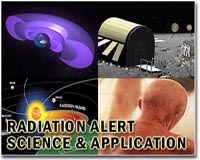 |
Beijing (AFP) March 17, 2011 Chinese retailers on Thursday reported panic buying of salt, partly because shoppers believe it could help ward off the effects of potential radioactivity from Japan's crippled nuclear power plant. "Salt sold out early this morning," an employee with a branch of French supermarket chain Carrefour in Shanghai told AFP, declining to give her name. She said all the salt was snapped up within 30 minutes of the store's opening on Thursday by anxious shoppers, adding that many customers reported salt prices at other shops in the city had risen as much as six-fold. A staff member at a supermarket in the southern city of Guangzhou said salt demand had spiked so sharply that the store had imposed temporary limits on how much each customer can buy. "There are many people queueing to buy iodised salt in our store. We have to control it. One client can only buy two bags of salt," she said. Anxiety has been growing in China over the potential harmful effects of radiation emissions from its Asian neighbour, despite repeated Chinese government announcements that the country faces no imminent health threat. Salt sold in China is mostly iodised as part of a national policy to prevent iodine deficiency disorders. Chinese consumers are now hoping iodine in the salt can reduce the impact of possible radioactivity as the crisis at Japan's Fukushima nuclear plant deepens. But state-run China National Radio said the iodine content of edible salt in the country averages between 20-30 microgrammes per kilogramme, quoting experts saying that is too low to have any effect. In one Beijing supermarket, salt was completely sold out by midday but still shoppers flocked in to try to buy some, most of them citing fears about radiation from Japan. "I saw on the Internet that salt was good to prevent contamination after the Japan quake, but I'm not entirely sure why," one customer told AFP. Some shoppers apparently also believe future salt shipments could be contaminated by the disaster and were buying now to stock up on supply, Xinhua news agency reported. The panic buying sent shares of salt producers higher Thursday, bucking the weakness in the broader market. Yunnan Salt & Chemical Industry surged by the 10 percent daily trading limit to 15.10 yuan in the morning session, as did iodised salt producer Inner Mongolia Lantai Industrial Co, which surged by 10 percent to 17.44 yuan. The benchmark Shanghai Composite Index fell 0.51 percent to 2,915.98 points. In an apparent move to calm nervous consumers, state-owned China National Salt Industry Corporation said Thursday that China "has rich salt reserves" and consumers do not need to hoard salt, Xinhua said. Radioactive iodine from a nuclear event can pollute the air and contaminate the food supply, while thyroid glands quickly absorb the radioactive substance, causing damage, according to the US Centers for Disease Control. Iodide pills can block radioactive iodine from being taken into the thyroid, it explained. The official China Daily said Thursday cydiodine tablets had sold out at many pharmacies in cities including Beijing and Shanghai after the earthquake and monster tsunami struck Japan leaving more than 13,000 dead or missing. A military hospital in Beijing on Wednesday started offering radiation testing services for people returning from Japan, state media said, as authorities stepped up checks on incoming travellers and goods for possible contamination. Meanwhile, prices of many Japanese imports -- from baby formula to lotions to fish -- have surged due to a supply crunch following the disaster, state media reports said.
Share This Article With Planet Earth
Related Links Space Technology News - Applications and Research
 Foreign governments urge nationals to leave Japan quake zone
Foreign governments urge nationals to leave Japan quake zoneTokyo (AFP) March 16, 2011 Foreign governments Wednesday urged their citizens to steer clear of quake-stricken northeast Japan and the capital Tokyo amid fears of further aftershocks and a widening nuclear disaster. US officials warned citizens living within 80 kilometres (50 miles) of the crippled Fukushima nuclear plant to evacuate or seek shelter amid mounting concern of a catastrophic meltdown. Britain advised ... read more |
|
| The content herein, unless otherwise known to be public domain, are Copyright 1995-2010 - SpaceDaily. AFP and UPI Wire Stories are copyright Agence France-Presse and United Press International. ESA Portal Reports are copyright European Space Agency. All NASA sourced material is public domain. Additional copyrights may apply in whole or part to other bona fide parties. Advertising does not imply endorsement,agreement or approval of any opinions, statements or information provided by SpaceDaily on any Web page published or hosted by SpaceDaily. Privacy Statement |